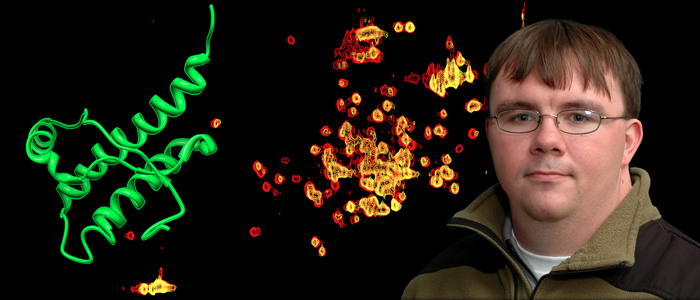Chemical Biology, Biochemistry and Biophysics (CB3)
CB3 first-year students participate in three seven-week laboratory rotations, while undertaking rigorous coursework that emphasizes critical evaluation of scientific models and experimental results. The program provides the flexibility to craft an individual curriculum that specifically suits the needs of the student's research interests. Second-year students take oral qualifying exams and initiate independent research projects that ultimately lead to their dissertation. Advanced graduate students work under the direct supervision of one of twenty-nine affiliated faculty members in a highly interactive, collaborative research environment. All students participate in a variety of seminars, advanced special topics courses, and research group meetings designed to provide continuing learning opportunities.
Required Course Work
Required Core Courses:
- Chem 200A: Advanced Biochemistry: Biophysical Methods
- Chem 271: Chemical Biology
- Chem 200B: Advanced Biochemistry: Protein Structure and Function
- BIOL 200F: Logic and Approaches to Scientific Discovery (will count toward your three elective courses)
- BIOL 289: Practice of Science
Elective Courses (students take 2):
- CHEM 169: Chemistry and Biology of Drug Design and Discovery
- CHEM 200C: Advanced Biochemistry: Enzyme Mechanisms and Kinetics
- CHEM 230: Grant Writing In Biomedical Research (2nd year or 3rd year students only)
- CHEM 234: Bioinorganic Chemistry
- CHEM 238: Topics in Biophysical Chemistry
- CHEM 242A: Modern Physical Organic Chemistry
- CHEM 242B: Modern Synthetic Methods in Organic Chemistry
- CHEM 242C: Spectroscopy and Applied Analytical Methods
- CHEM 256C: Advanced Topics in Inorganic Chemistry
- CHEM 256D: X-Ray Crystallography
- CHEM 262: Statistical Mechanics
- CHEM 263: Quantum Mechanics
- CHEM 264 Quantum Theory of Atoms and Molecules
- CHEM 265: Computer Simulation in Statistical Mechanics
- CHEM 272: Mass Spectrometry: Fundamentals and Applications
- AMS 5 or 7: Statistics or Biostatistics
- AMS 113: Managerial Statistics
- BIOL 200B: Advanced Molecular Biology
- BIOL 200D: Developmental Biology
- BIOL 201: RNA Processing
- BIOL 203: Ribosomes and Translation
- BIOL 204: Chromatin and Transcription
- BIOL 205: Epigenetics
- BIOL 206: Introduction to Stem Cell Biology
- BIOL 206L: Current Protocols in Stem Cell Biology
- BIOL 207: Population Genetics
- BIOL 215: Applied Statistics for Molecular, Cell, and Developmental Biology
- BIOL 226: Advanced Neuroscience
- BIOL 228: Advanced Topics in Cellular & Developmental Neurobiology
- BME 110: Computational Biology Tools
- BME 128: Protein Engineering
- BME 205: Bioinformatics
- BME 210: Applications & Analysis of Microarrays
- BME 215: Applied Gene Technology
- NME 229: Protein and Cell Engineering
- BME 230: Computational Genomics
- BME 272: Precision Medicine
-
BME 273: Stem Cell Epi/Genomics
-
BME 275: Entrepreneurship in Biotechnology
- BME 278: Stem Cell Biology
- METX 202: Cellular and Molecular Toxicology
- METX 210: Bacterial Pathogenesis
 |
UCSC's graduate Program in Biomedical Sciences and Engineering is supported by training grants from the National Institute of General Medical Science and the National Human Genome Research Institute. |

